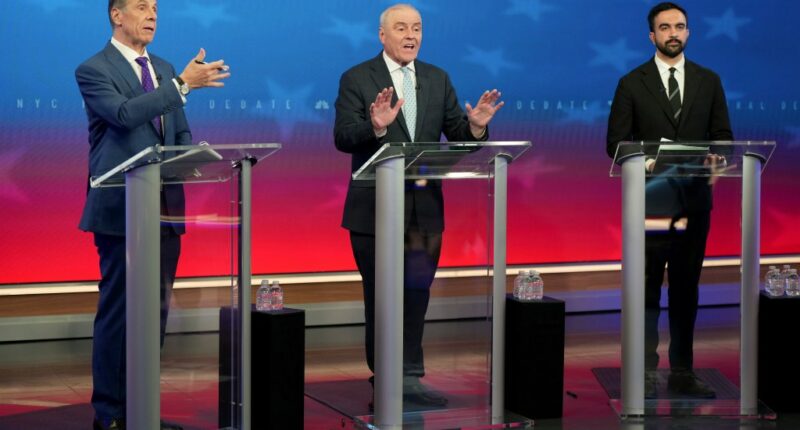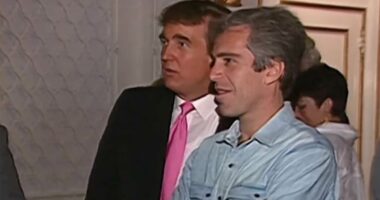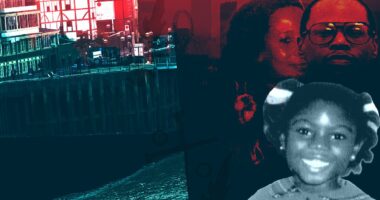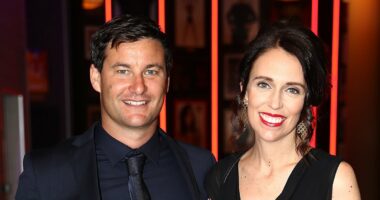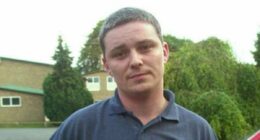Share this @internewscast.com

Jewish issues have recently become a focal point in the media. Notably, during last week’s initial New York City mayoral debate, a significant 15 minutes were devoted to discussing antisemitism and the conflict in Gaza—an unusually lengthy period for such topics. However, this kind of attention does not always bode well.
Despite the intense spotlight on Jewish New Yorkers, the mayoral candidates have not been forthcoming with concrete strategies to address their community’s needs. The discussion has been heavy on rhetoric but light on actionable policies, lacking any clear plans for enhancing Jewish safety, fostering inclusion, or ensuring representation. As Election Day approaches, voters deserve a more substantial dialogue.
During a recent conversation, Zohran Mamdani addressed a Jewish audience by expressing his desire to support them when “the mezuzah falls.” It’s important to note that mezuzahs don’t just “fall”—they are often targets in antisemitic hate crimes. Supporting the Jewish community involves identifying those responsible for such antisemitic acts, whether it be verbal and physical assaults, disruptions of religious practices, vandalism of Jewish institutions, or economic boycotts against Jewish and Israeli businesses. These actions contribute to an increasingly hostile environment.
New York City has witnessed a troubling surge in anti-Jewish bigotry and violence. Despite Jews representing only about 10% of the population, the NYPD reported in 2024 that they accounted for 54% of hate crime victims, a figure that has climbed to 62% this year. Much of this violence is driven by individuals adhering to an “anti-Zionist” ideology.
As the final debate approaches, voters require clarity on several pressing questions. For instance, Andrew Cuomo frequently emphasizes his support for “Israel’s right to exist,” but how does he propose to address the challenges and insecurities faced by Jewish and Israeli New Yorkers?
- How do you define and understand contemporary manifestations of antisemitism — in order to fight it?
Andrew Cuomo constantly reiterates his support for “Israel’s right to exist.” But how does he understand and plan to respond to the pain and vulnerability experienced by Jewish and Israeli New Yorkers?
Mamdani declared that he will rescind a mayoral executive order adopting the International Holocaust Remembrance Alliance definition of antisemitism — the most widely accepted, internationally adopted definition. How would a Mamdani administration define, identify and confront antisemitism?
- Which Jewish leaders would you appoint to your transition team, and how will you weigh and consider their advice?
Mamdani declared that he will convene a “team of rivals” in City Hall, but also that people who are “progressive except Palestine” (read: those who support Jewish sovereignty, aka Zionists) are unwelcome in his coalition. Would he create a litmus test for Jewish leaders in his administration?
Curtis Sliwa has derided Orthodox Jews as unlike “normal Americans” and mocked them for “studying Torah and Talmud all day.” He said that, despite having Jewish children, “I also have to hold myself back sometimes” from perpetuating antisemitism. With explosive hate primarily targeting Orthodox Jews, would Sliwa leave them out of his administration?
- How will you ensure safety for Jewish New Yorkers, including by directing your police commissioner to allocate resources to protect them?
Three quarters of Jewish New Yorkers believe antisemitism is a serious threat, and 40% are hiding visible signs of their Jewish identity. Antisemitic incidents are among the hate crimes most likely to involve felonies but least likely to involve arrests. At a time of such heightened Jewish vulnerability, and while the Trump administration has refused to distribute congressionally allocated federal funds under the Nonprofit Security Grants Program, Jews want to know how their Mayor will guarantee their physical safety.
Mamdani has committed to a police presence outside synagogues during the High Holy Days, but how will he protect Jews for the other 350 days a year?
What tools and levers of government will Cuomo utilize to address rising antisemitism, and how will he track the impact of his efforts?
Given Sliwa’s long history of tension with the NYPD, and long-term strategy of outsourcing community safety with vigilantism, how will he overcome apparent mistrust to build a constructive relationship with law enforcement?
- Will you call out antisemitism from your political allies, even when it is politically inconvenient?
There is, unfortunately, no shortage of antisemitism on either side of the political spectrum. While it may manifest differently, we are living in a moment that painfully proves the horseshoe theory: extremists on both the far right and far left converge in their hostility toward Jews. From DSA to MAGA, they echo the same conspiratorial and dehumanizing stereotypes. Leadership means fighting it among your own ranks, not pointing elsewhere as a political strategy. How will each of the candidates fight antisemitism among their own supporters, colleagues and movements?
With just days until early voting opens, the Jewish community deserves serious answers, not slogans, about how our next mayor will confront antisemitism and ensure our full inclusion and safety in the city we call home.
Berman is founder and CEO of Zioness Movement and Zioness Action Fund, which advocate for those who are both progressive and Zionist.
